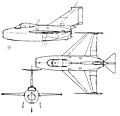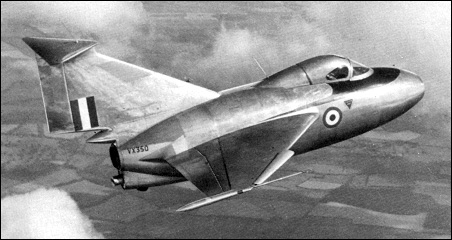|
| There is no text information for this aircraft at the moment.
 | A three-view drawing (1351 x 1305) |
| WEIGHTS |
| Empty weight | 3084 kg | 6799 lb |
| DIMENSIONS |
| Wingspan | 5.95 m | 20 ft 6 in |
| Length | 7.99 m | 26 ft 3 in |
| PERFORMANCE |
| Max. speed | 1011 km/h | 628 mph |
| Pablus, e-mail, 27.04.2014 04:50 By the looks of it, it's actually a delta with a small pitch control vane at the top of the stabiliser. reply | | b flewitt, e-mail, 19.02.2013 00:12 There seems to be an awful lot of fuselage in front of the wings and tailplane.Looks like it might be unstable. reply | | lechrus, e-mail, 18.03.2010 00:54 My research leads me to believe that the wing skins may have been fabricated from Durestos, an asbestos felt reinforced phenolic resin, selected because it was cheaper and had a higher specific stiffness than the emerging glass fibre /polyester resin composite materials of the period. The higher skin temperatures of transonic flight might have also played a role. Talk about being ahead of its time. reply | | M Halle, e-mail, 03.10.2009 17:05 My father in law worked for Fairy Aviation then Fairey Engineering for 40 years - he has passed away and we are sorting though his effects. I came across a large technical document for a Prototype aircraft called the E.10 /47 from 1950. The drawing of the plane looks similar to the FD1. Is there any organisation who collects this type of document? reply | |
| | Uppy, e-mail, 02.10.2008 21:27 FD1. First flight March 12 1951. Delta-winged research plane. Control proved difficult. reply |
|
Do you have any comments?
|
| 
COMPANY
PROFILE
All the World's Rotorcraft
|











